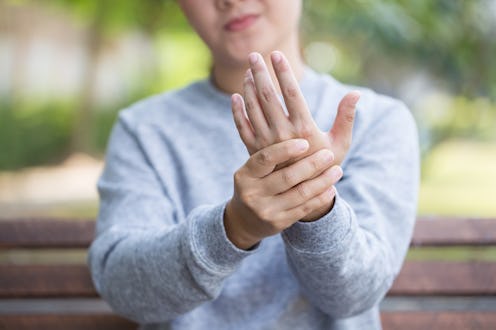Life
9 Everyday Habits That Could Affect Your Chances Of Getting Arthritis
Most young people don't tend to think much about arthritis. However, like many other areas of our health, the habits we do now have an effect on our chances of getting arthritis later. There are even some things that cause arthritis that you may be doing everyday without realizing. Even though arthritis may not be at the top of your mind now, it's important to pay attention to the little habits you do that can cause issues down the road.
“We’ve all heard the term arthritis and know that it is a very painful condition that we definitely want to avoid," Gregory Mallo, MD, orthopedic surgeon and co-chief of the Department of Orthopedics at St. Charles Hospital, tells Bustle. "Arthritis is a ... way of referring to any type of pain in the joint. In reality, there are more than 100 different types of arthritis. In general, arthritis is the loss of the soft cushion on the ends of each bones that makes up a joint. When this spongy cushion, called articular cartilage, wears away, the bone itself becomes exposed along with many painful nerve fibers."
Although some forms of arthritis have a genetic component making some people more prone to developing it, there are some very basic daily life habits that can increase your risk. Here are nine little harmless habits that can make you more likely to get arthritis, according to experts.
1Texting
Texting frequently and holding your phone in the exact same position can cause “smartphone thumb." "This leads to wear and tear and pain at the base of our thumb joint," Dr. Darria Long Gillespie tells Bustle. "Try to dictate as much as possible, or change your phone position while you’re holding it."
2Wearing Unsupportive Shoes
Wearing high heels and other fashionable shoes may look good, but if they're not supporting your feet, they could be hurting your health. "Narrow, pointy shoes that squish the toes together stretch the stabilizing ligaments of these toes," says Mallo. "Repetitive use of narrow toe-box shoes causes permanent deformity and results in painful bunions. This eventually progresses into destruction of the cartilage, and arthritis especially in the large toe." While wearing certain shoes doesn't guarantee arthritis, switching out the types of shoes you wear is a good idea to keep your feet happy and healthy.
3High Impact Exercises
Exercise is of course a healthy habit, but certain forms can accelerate the development of arthritis if someone is not careful. "High-impact activities, like basketball, involve repetitive jumping and result in high forces being transmitted across your ankle, knee, and hip joints," says Mallo. "Also, running on firm surfaces like concrete can dramatically increase your risk of osteoarthritis. Lower impact exercises like swimming, elliptical trainers, or running on grass are preferred." But if you do enjoy more high impact exercises, speak with your doctor about how to decrease the stress it may be causing to your joints.
4Hunching Over
"Whether you’re laying in bed with your neck bent to read your Kindle or hunching to look at your laptop, we’re seeing more and more young people come in with neck pain from poor posture of looking at devices," Dr. Darria Long Gillespie tells Bustle. "Make sure to elevate your devices so that you bring them to you. Don’t bend over to bring your eyes to them." And giving your back a nice stretch at different points throughout the day couldn't hurt, either.
5Smoking
Smoking can harm more than just your lungs. "According to researchers at the Mayo Clinic, smoking is linked to the development of rheumatoid arthritis, as it is thought to ignite and fuel overactive immune systems in individuals with other autoimmune conditions," says Mallo. Rheumatoid arthritis is an autoimmune disease that affects your joints, and it was also found that drugs used to treat rheumatoid arthritis can be made less effective if someone is a smoker.
6Drinking Alcohol
Drinking is OK in moderation, but drinking large quantities of alcoholic beverages can cause an elevation of uric acid and, consequently, gout. "Gout is the accumulation of crystals which affects a person’s joint," says Mallo. "Frequent or persistent gouty attacks cause the release of erosive enzymes into the joint, which damage the soft, spongy articular cartilage. If you suffer from gout, drinking in moderation or avoiding alcohol is an excellent strategy to prevent arthritis."
7Driving With The Rear-View Mirror Pointed Too High
Make sure your rear-view mirror is placed accurately to ensure good posture. "To avoid slouching in the car, try adjusting the central rear-view mirror to give you an optimal view when you are seated in the most upright position for your low back," Dr. Kaliq Chang of the Atlantic Spine Center tells Bustle. "You will be forced to maintain that position during your drive to make sure you still can see behind you."
8Prolonged Sitting
"Prolonged sitting puts tremendous pressure on the bones and discs," Dr. David A. Shapiro, DC, CEO tells Bustle. "This pressure causes arthritis. Abnormal posture or spinal structure causes spinal arthritis because the bones wear when spinal structure is not ideal." Your best bet from combatting the physical effects of a desk job? Try some desk exercises, and make sure to get up and walk around at different intervals throughout the day.
9Sleeping On Your Back With Too Many Pillows
Sleeping on your back with too many pillows can bend your neck in an unnatural position. "This is very unhealthy to your spine and contributes to arthritis," says Dr. Shapiro. "As your spine gets arthritic, you will find that you’ll become dependent upon that two pillow support and can’t sleep any other way." So try out different sleeping positions, and see if you can reduce your pillows from two to one.
Although these habits may not guarantee an eventual arthritis diagnosis, it's important to know how your habits now may impact your health later.
This article was originally published on
